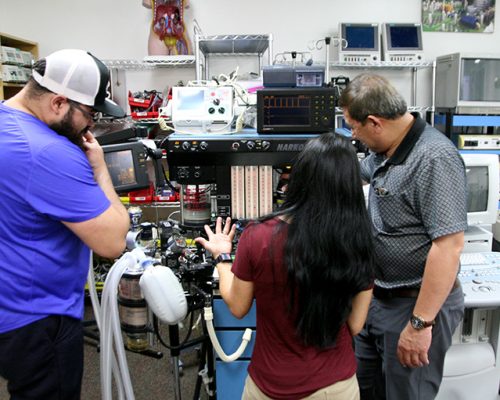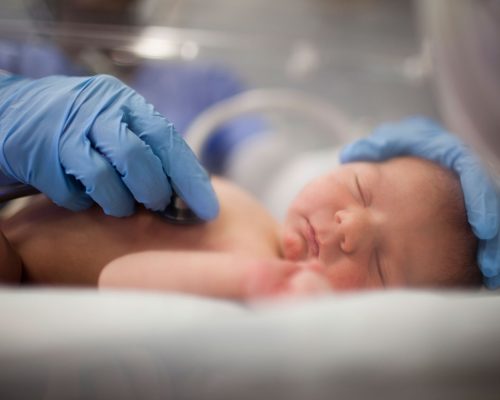As a leading manufacturer of neonatal transport incubators and other NICU care products, International Biomedical is committed to providing resources that empower healthcare professionals in delivering the highest standard of care for our most delicate patients. In this post from the International Biomedical blog, we’ll deep dive into the critical subject of neonatal transport guidelines, established by the American Academy of Pediatrics, also known as AAP.
Who Establishes the Neonatal Transport Guidelines?
The American Academy of Pediatrics (AAP), a highly respected authority in child health, establishes and details neonatal transport guidelines. The AAP brings together a team of experienced pediatricians and other healthcare professionals to develop guidelines and standards aimed at the optimal health and safety of newborns during transport. This guidance is based on a meticulous review of medical literature and a wealth of collective clinical experience. Their guidelines are widely recognized and adopted not just in the United States, but across the globe.
The AAP’s Role in Neonatal Transport
The AAP’s neonatal transport guidelines cover a wide array of areas, including medical, nursing, respiratory, and nutritional considerations for transported neonates. They provide information on pre-transport stabilization, equipment needs, methods of transport, and protocols to ensure the most efficient, safe, and effective transfer.
In addition, the AAP emphasizes the need for quality improvement measures. These include ongoing education and training for transport personnel, regular reviews and audits of neonatal transport services, and research to continually improve neonatal transport care.
At International Biomedical, we closely align our products and innovations with the recommendations set forth by the AAP. Our commitment to adhering to these guidelines is unwavering. This adherence ensures that our neonatal transport incubators, along with our entire NICU product range, meet the highest standards for patient safety and care.
The Key Elements of Neonatal Transport Guidelines
Guidelines provided by the American Academy of Pediatrics (AAP) form the foundation of safe and effective neonatal transport. Here are the key elements:
Selection of Appropriate Transport Equipment
AAP guidelines highlight the necessity of suitable and safe transport equipment. At International Biomedical, all of our transport incubators align with these guidelines. Our comprehensive solutions for both ground and air transport can be further customized with integrated ventilators and monitors to provide essential real-time data.
Training of Transport Personnel
A team skilled in neonatal critical care is indispensable for the transport process. The AAP guidelines recommend the team typically include a neonatal nurse, a respiratory therapist, and a neonatologist or a neonatal nurse practitioner, all proficient in pediatric care and life support techniques.
Pre-Transport Stabilization of Infant
The AAP emphasizes the importance of stabilizing the infant before transport. This involves administering necessary medications, optimizing ventilation and oxygenation, ensuring appropriate thermoregulation, and managing nutrition and hydration.
Clear and Regular Communication
The AAP underscores the need for regular communication among the transport team and between the sending and receiving facilities. This helps to ensure a coordinated approach to the infant’s care and optimizes the readiness of the receiving facility.
Quality Improvement Measures
According to the AAP, neonatal transport services should be subject to regular audits and reviews to ensure guideline compliance, enhance service quality, and maximize patient safety. This includes ongoing education and training for transport personnel, ensuring continuous improvement in neonatal transport care.
These key elements, as outlined by the AAP, underpin our practices at International Biomedical, guiding us in delivering the highest level of care to neonates during transport.
Advancing Neonatal Care with International Biomedical
Understanding and implementing the AAP’s neonatal transport guidelines is vital to providing the highest quality of care for our NICU patients. These guidelines are not just about transporting a patient from one location to another. They’re about ensuring that the journey is carried out with the utmost care, precision, and attention to detail to uphold the best possible health outcomes.
At International Biomedical, we’re committed to embodying these guidelines in our work and our products. We strive to innovate and evolve alongside these guidelines to offer cutting-edge solutions that meet the highest standards of neonatal care. As we continue to navigate this complex yet critically important field, know that International Biomedical is with you every step of the way, offering a reliable partner in your neonatal care journey.









